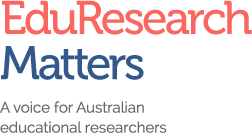EduResearch Matters presents all the articles it published in the lead-up to the 2025 Australian federal election 2025, held on on May 3.
Table of contents
AARE election priorities
Boosting the teacher workforce
Anna Hogan, QUT: “Workforce sustainability won’t be solved through recruitment alone; we need to focus on retention by making the job one that teachers can realistically and sustainably do.”
Nicole Mockler, The University of Sydney: “The more we assume that teachers need think tanks or economists or politicians or anyone else to ‘help them fend’, the more it feeds the teacher shortage. Teachers are human. If they don’t feel valued, and are constantly exposed to arguments about their work mounted by people with strong views but next to no actual knowledge of their work, it’s hard to keep showing up.“
Steven Hodge, Griffith University, and Emily Ross, University of Queensland: “Research shows teachers feel obliged to make modifications because they know their students and are ethically bound to adjust resources to suit them.”
Steven Hodge, Griffith University: “We want experts to be VET teachers. Here’s what happens next”Honouring the desire in teachers to advance their industries and pass on quality practices is something that could help everyone linked to the VET system – and that really is everyone!”
Connection solutions
Martin Mills, QUT: “There are multiple crises facing education. These relate, amongst other things, to teacher shortages, to the fair distribution of the academic benefits of schooling, and to providing young people with an adequate preparation for living in a complex and fast changing world.”
Donna Pendergast, Griffith University: “The possibility to explore greater connectedness and a longitudinal framework of success for our students is needed now.”
Research-informed policy
Emma Rowe, Deakin University: We have a great deal of expertise within universities without resorting to think-tanks or knowledge brokers, who do not make their finances or funding apparent.
Penny Van Bergen, Macquarie University: “Evidence-based policymaking means turning away from populist views and towards genuine topic experts who have the expertise to advise how robust particular phenomena are, whether suggested applications are generalisable or specific to particular ages and disciplines, and how these insights knit together with other phenomena, explanations, and educational goals. Such policymaking is more challenging, but worth it. Our children deserve it.”
Gwilym Croucher, University of Melbourne: “If Australia seeks to send signals that we do not welcome students or our education quality is seen to be slipping, the future might not be so sunny. The major source countries of China and India are building their domestic systems. China has invested vast sums in educating its population.”
Equity and educational outcomes
Pat Thomson, University of South Australia: “So this is my challenge for those currently standing for election, an election where poverty seems to be off the agenda. We need a bold new vision for addressing the long tail of educational underachievement and child poverty. We need the courage and curiosity to inquire, to review, to face up to the equity challenge. One in six Australian children needs your commitment to do better.”
Kitty te Riele, Sherridan Emery and Emily Rudling, University of Tasmania: “It is not too late to learn from the pandemic – and to systematically and sustainably introduce approaches that proved to make our education, and our society, more equitable.”
Robert Hattam, University of South Australia: “This inequality machine is now well ensconced and teflon-coated and there are many snouts in the trough, making money from sustaining a failing policy regime. Is it possible that Australian schooling could become a machine for equality?”
Jill Blackmore, Deakin University: “Academic workforce is extremely discontented with the system and disenchanted with university management—they feel undervalued as core workers. The university sector has been corporatised, managerialised, marketized, commercialised and now digitalised. Gen AI is impacting on teaching and research.”
Widening participation, nurturing aspirations
Marnee Shay, University of Queensland: “Enabling aspirations and strong futures means building a rigorous, research-informed understanding of how the most educationally disadvantaged students can thrive in all schooling contexts.”
Sally Patfield, University of Newcastle: “As we look towards the future of university admissions, we must move beyond the damaging depictions of early entry. These condemn young people for using these pathways. Instead, we must consider how these principles can foreground reform in this area, and how admissions processes can continue to evolve to better meet the needs of all Australians.”
Emma Burns, Macquarie University: “Sadly, one of the main factors that differentiates schools with cultures that foster adaptive emotional coping, social relationships, and achievement and those with less positive cultures is socio-economic and cultural status.”
Sarah O’Shea, Charles Sturt University:
Will we ever have an education election?
Julie McLeod, University of Melbourne: “For a resoundingly re-elected government, heading into a new term with ambitious commitments to building fairer futures and lifting aspirations, this is the time for education to be elevated as a national priority, to be a defining feature of the coming years – not just bits and pieces of help to make different stages of the education journey more affordable but to deliver on bigger and more systematic reform.”





